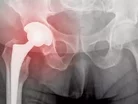Johnson & Johnson are no longer selling metal-on-metal hip implants

Written by Alyssa Clark
The household family name of Johnson & Johnson came out this week with an announcement that will change the hip-implantation process. Being the world’s largest maker of healthcare products, Johnson & Johnson said it will no longer sell metal-on-metal or ceramic-on-metal hip replacements. The demand for these replacements has been waning in recent years and the U.S. regulators are now seeking new rules for these hip-related devices.
“We won’t have any metal-on-metal or ceramic-on metal hips any longer,” said Mindy Tinsley, a spokeswoman for J&J’s DePuy unit, said in a telephone interview. “We’ve seen, for example, a 90 percent decline in metal-on-metal sales industry-wide in the U.S. and Europe since 2007. There’s really not a viable market for these bearing combinations anymore.”
In an email from the New jersey-based office, Johnson & Johnson wrote that after August 31st of this year, the metal liners in the Ultamet Metal-on-Metal Articulation and the Complete Ceramic-on-Metal Acetabular Hip System will no longer be available. Johnson and Johnson DePuy Orthopaedics unit will stop selling in 2014, in order to “simplify and streamline its offerings, the company said”.
“Metal-on-metal hip sales in the U.S. and Europe plunged from 20 percent of the market in 2007 to less than 2 percent last year as doctors questioned their safety and patients filed lawsuits citing flawed products. The global hip-implant market may be $5.7 billion in 2013”, according to Lawrence Biegelsen, an analyst at Wells Fargo in New York.
“DePuy made the decision to discontinue these products because of low clinician use of Ultamet and Complete, the availability of other options that meet the clinical needs of patients and proposed changes in FDA regulation of the entire class of metal-on-metal products, which includes Ultamet,” the company said in the statement.
About the Author
Alyssa Clark is the Editor of Healthcare Global



